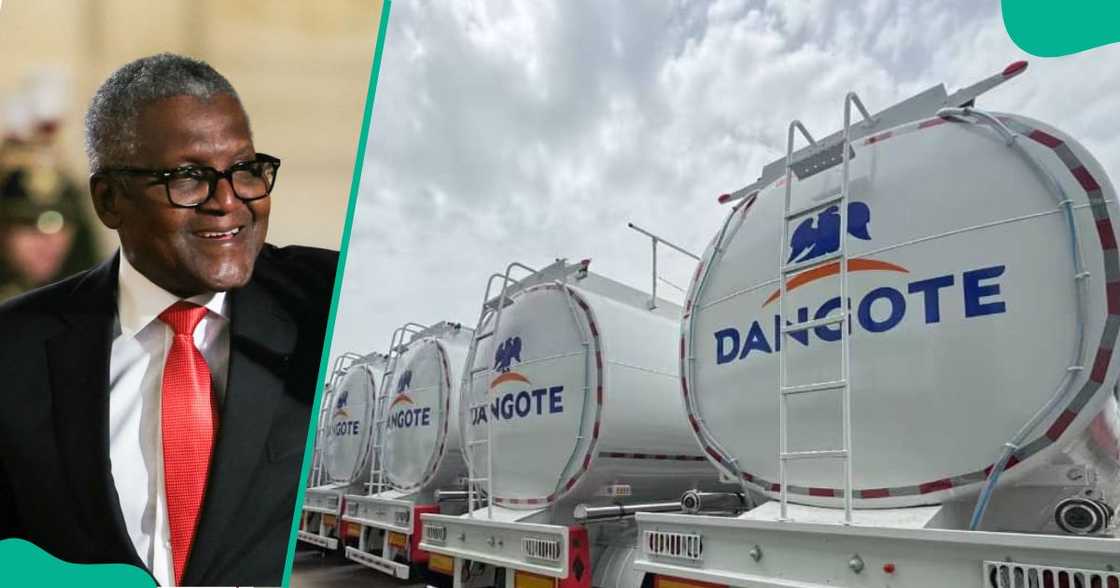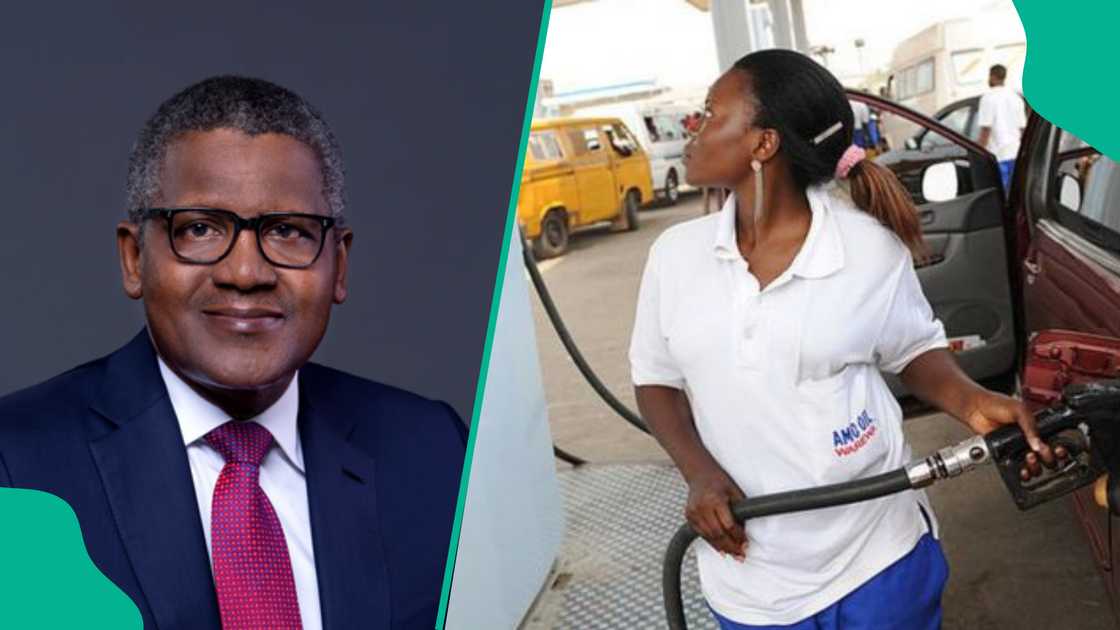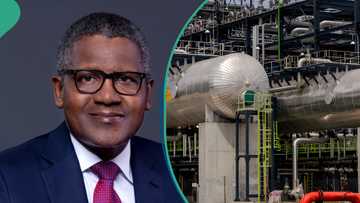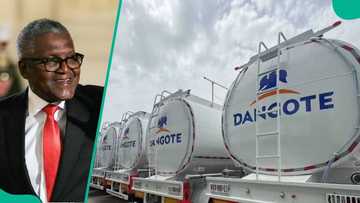Dangote's Fuel Revolution: Price War Begins as Winners and Losers Emerge
- Experts have predicted a petrol and diesel price crash following Dangote Refinery’s new fuel distribution strategy
- They disclosed that while the new plan will impact the consumers positively, it will affect depot owners and truckers
- However, they disclosed that due to the refinery’s plan, Nigerians may begin to buy petrol at ₦835 to ₦850 per litre
Legit.ng’s Pascal Oparada has reported on tech, energy, stocks, investment and the economy for over a decade.
A shake-up is underway in Nigeria’s downstream petroleum sector as the Dangote Refinery gears up for a nationwide fuel distribution network, set to launch on August 15, 2025.
This ambitious plan, backed by a fleet of 4,000 CNG-powered trucks and attractive incentives like free logistics and credit facilities, is poised to create a new order, crowning clear winners and leaving many traditional players facing an existential threat.

Source: Getty Images
Winners and losers of fuel price war
Experts have said that the move is already triggering a price realignment, with consumers watching keenly for a potential drop in the cost of petrol and diesel.
According to them, the impact of Dangote's direct-to-retail strategy will be a double-edged sword for existing fuel marketers and retail outlets in Nigeria.
They disclosed that the winners will be independent marketers in underserved areas.
Independent marketers, particularly those in rural and remote locations, have grappled with inconsistent supply and high ex-depot prices from coastal depots for years.
Dangote's ability to deliver directly to their stations at a uniform price, including logistics, will be a game-changer, ensuring a steady flow of products and potentially revitalising dormant outlets.
“Dangote's decision to supply directly to marketers is a win for both the company and Nigerians who live in areas far from Lagos. For Nigerians, it will cut the prices of the products in those locations, like Borno, Yobe, Cross River, Akwa Ibom, etc.
For the company, it will sell more of its products, and will also enjoy goodwill from Nigerians who see it as the most patriotic businessman. But for retailers, it's a bad day,” Financial analyst, Ishaya Ibrahim, told Legit.ng.
Additionally, large industrial consumers such as manufacturing companies, construction firms, and other businesses that rely heavily on diesel and petrol will benefit significantly from direct bulk purchases from the refinery.
This will likely translate to lower operational costs and increased efficiency.
Also, consumers will benefit as the increased competition and elimination of several layers in the supply chain are expected to lead to more stable and potentially lower fuel prices at the pump for the average Nigerian.
Depot owners and marketers will lose
However, the experts say that depot owners, who play the traditional role of depot owners as intermediaries, are under serious threat.
With Dangote bypassing them to supply directly to retail outlets, many depots may become redundant, facing a sharp decline in revenue from storage and throughput services.
Marketers who have historically relied on importing petroleum products will find it increasingly difficult to compete with the locally refined and competitively priced fuels from the Dangote refinery.
Independent truckers will lose
The volatility of the foreign exchange market further disadvantages importers.
While Dangote's investment in its fleet of CNG-powered trucks will enhance efficiency and environmental friendliness, it poses a direct challenge to the thousands of independent truck owners and drivers who have been the backbone of fuel distribution in Nigeria.

Read also
Dangote Refinery releases registration details for marketers and 4,000 trucks for fuel distribution
The overarching fear among many existing players, particularly the Petroleum Products Retail Outlets Owners Association of Nigeria (PETROAN), is the potential for Dangote to leverage its scale to create a monopoly, which could, in the long run, stifle competition and dictate prices.
Petrol and diesel prices to crash
Osas Igho, an energy policy analyst, said that Dangote's entry into the market has already demonstrated its potential to influence pricing. The refinery has been adjusting its ex-depot prices for both petrol and diesel, creating a more competitive landscape.
Igho projected that based on Dangote's recently announced ex-depot price of around ₦835 - ₦850 per litre and the inclusion of free delivery, the retail price at Dangote's partner outlets and other stations that source directly from the refinery is predicted to stabilise within the range of ₦870 to ₦920 per litre nationwide.
This represents a potential decrease from the current average prices in many parts of the country, which can be significantly higher, especially outside major cities.

Source: Getty Images
Also, the impact on diesel prices is expected to be even more pronounced. With Dangote crashing the ex-depot price to as low as ₦940 per litre for bulk purchases, the retail price of diesel is projected to fall and stabilise between ₦980 and ₦1,050 per litre.

Read also
Depot owners speak as Dangote unleashes 4,000 fuel trucks nationwide, begins distribution bonanza
This will be a significant relief for the manufacturing and transportation sectors, which are major consumers of diesel.
“These predictions are, however, subject to the stability of the Naira and the global price of crude oil. The "Naira-for-crude" deal between the Nigerian National Petroleum Company Limited (NNPCL) and the Dangote Refinery is a critical factor that will continue to influence domestic pricing,” Igho said.
Dangote, more depot owners increase petrol
Legit.ng earlier reported that fuel depot owners have increased their prices in response to a global oil spike.
Between Wednesday, June 11, and Friday, June 13, 2025, fuel prices rose sharply by as much as 14.6% in some locations.
The development came amid a notable rally in global crude oil prices. Brent gained about 5.54%, closing at $73.20, WTI hit 5.58% to $71.84, while Murban crude rose 4.84% to sell at $72.60 per barrel.
Proofreading by Kola Muhammed, copy editor at Legit.ng.
Source: Legit.ng



